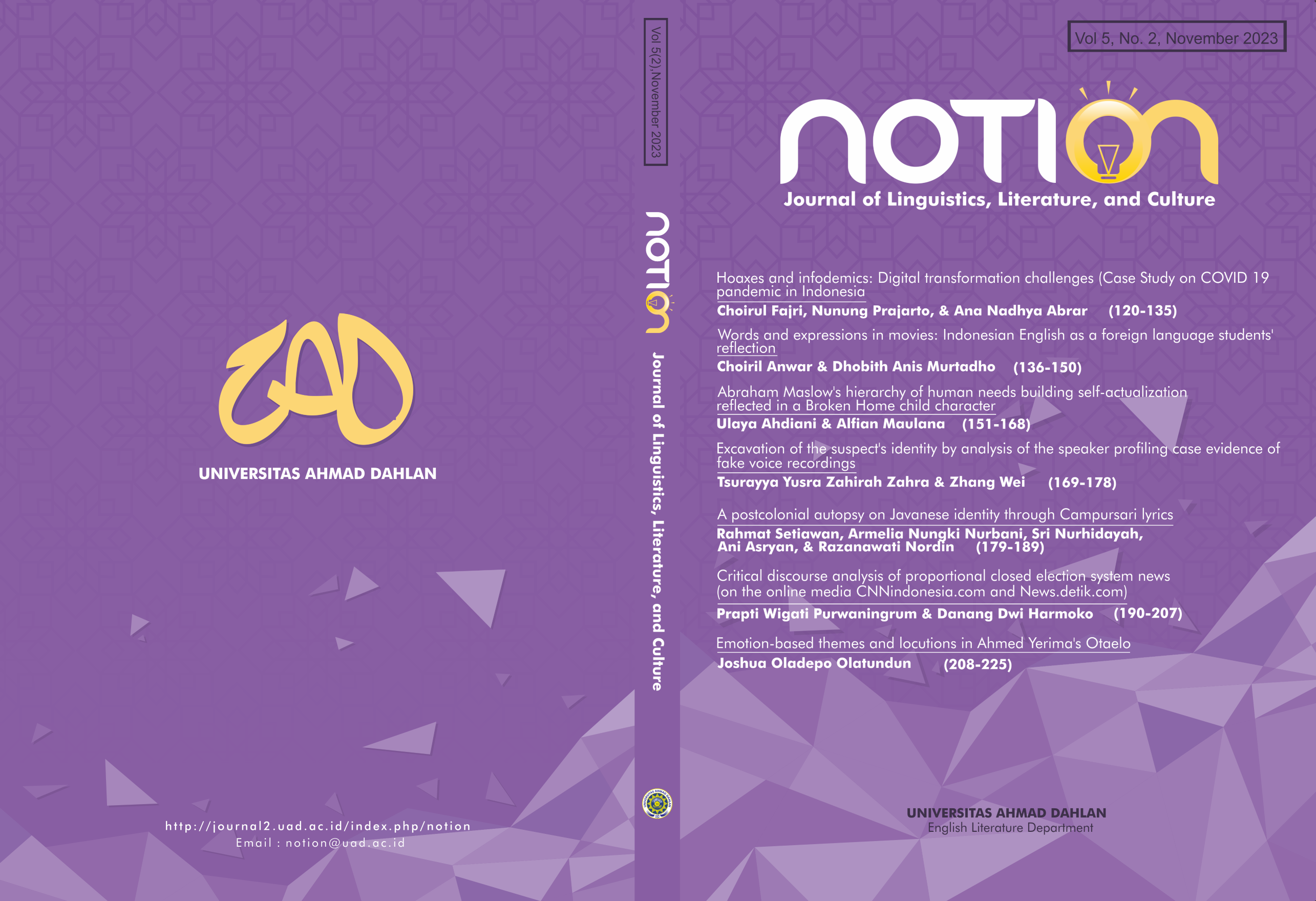Excavation of the Suspect's Identity by Analysis of the Speaker Profiling Case Evidence of Fake Voice Recordings
DOI:
https://doi.org/10.12928/notion.v5i2.8038Keywords:
Forensic Linguistics, Speaker Profiling , Fake Voice , Recording, Lesti , Rizky BillarAbstract
Technological developments, especially in AI applications, allow someone to commit criminal acts by changing other people's voices. This study implements forensic linguistics by comparing data sources on the audio of Lesti (L) and Rizky Billar (RB) to ensure the originality of the sounds. The Speaker Profiling method with aural-perception analysis is used because there is no valid comparative evidence, so the audio comparison is taken from the L and RB platforms published to the public. This research resulted in two different aspects of each audio: phonetics and acoustics. These two aspects show the two audio sources' differences in pronunciation, emphasis, frequency, and tone. As a result, the vote is identified as a hoax. This research can demonstrate the use of software to help identify individual language profiles; it contributes to the development of applied linguistics, especially as a legal aid tool. Researchers hope that there will be further research from other linguists that will address more benefits of using AI / Corpus technology as a linguistic analysis tool, both with spoken and written data.
References
Ahuja, P., & Vyas, J. M. (2018). Forensic speaker profiling: the study of supra-segmental features of Gujarati dialects for text–independent speaker identification. Australian Journal of Forensic Sciences, 50(2), 152-165. https://doi.org/10.1080/00450618.2016.1237547
Barraud, B. (2016). La linguistique juridique: La recherche juridique, L’Harmattan. ffhal-01367747
Chaer, A, L. Agustina. (2010). Sosiolinguistik: Perkenalan Awal: Edisi Revisi. Jakarta: Rineka Cipta.
Deslauriers-Varin, N. (2020). Introduction : l’enquête policière et les techniques d’enquête : de la pratique à la recherche. Criminologie. 53(2), 5–16. https://doi.org/10.7202/1074186aradresse copiéeune erreur
Gibbons, J. (2003). Forensic linguistics: An introduction to language in the justice system. John Wiley & Sons.
Hamid, A., & Mboka, I. (2021). Isolect Language Status of Wakatobi Language in the Sikka Islands (A Dialectological Study). Budapest International Research and Critics Institute (BIRCI-Journal): Humanities and Social Sciences, 4(4), 8397-8407. https://bircu-journal.com/index.php/birci/article/view/2781
Hollien, H., & Schwartz, R. (2000). Aural-perceptual speaker identification: problems with noncontemporary samples. Forensic linguistics, 7, 199-211. https://pubmed.ncbi.nlm.nih.gov/11210926/
Mahsun. (2017). Metode Penelitian Bahasa; Edisi ke-3. Depok: Raja Grafindo Persada.
Mesthrie, R. (Ed.). (2011). The Cambridge handbook of sociolinguistics. Cambridge University Press.
Nadar, F. X. (2009). Pragmatik & penelitian pragmatik. Yogyakarta: Graha Ilmu.
Satjadibrata, R. (2022). Kamus Sunda-Indonesia. Kiblat Buku Utama.
Schilling, N., & Marsters, A. (2015). Unmasking identity: Speaker profiling for forensic linguistic purposes. Annual Review of Applied Linguistics, 35, 195-214. https://doi.org/10.1017/S0267190514000282
Sholihatin, E. (2017). Pencemaran Nama Baik: Kajian Linguistik Forensik. Disertasi Pascaunesa.
Sugiarto, S., & Qurratulaini, R. (2020). Potensi Kriminal Cyber Crime pada Meme: Sebuah Kajian Linguistik Forensik. Deiksis: Jurnal Pendidikan Bahasa dan Sastra Indonesia, 7(1), 46-57. https://doi.org/10.33603/deiksis.v7i1.2495
Verhaar, J. W. M. (2016). Asas – Asas Linguistik Umum; Cetakan ke-9. Yogyakarta: Gadjah Mada University Press.
Warami, H. (2014). Legitimasi Kekuasaan dalam UU Otsus Papua: Kajian Wacana Kritis. DisertasiDoktor. https://sukarsa.unud.ac.id/repositori/disertasi?nim=1190171005
Watt, D., & Llamas, C. (2010). The identification of the individual through speech. Language and identities, 76-85. https://pure.york.ac.uk/portal/en/publications/the-identification-of-the-individual-through-speech
Downloads
Published
Issue
Section
License
Copyright (c) 2023 Tsurayya Yusra Zahirah Zahra, Zhang Wei

This work is licensed under a Creative Commons Attribution 4.0 International License.
Authors who publish their articles in NOTION: journal of Linguistics, Literature, and Culture agree to the following terms:
- Authors retain the copyright and grant the journal right of first publication with the work simultaneously licensed under a Creative Commons Attribution 4.0 International License that allows others to share the work with an acknowledgement of the work's authorship and initial publication in this journal.
- Authors are able to enter into separate, additional contractual arrangements for the non-exclusive distribution of the journal's published version of the work (e.g., post it to an institutional repository or publish it in a book), with an acknowledgement of its initial publication in this journal.
- Authors are permitted and encouraged to post their work online (e.g., in institutional repositories or on their website) prior to and during the submission process, as it can lead to productive exchanges, as well as earlier and greater citation of published work.





